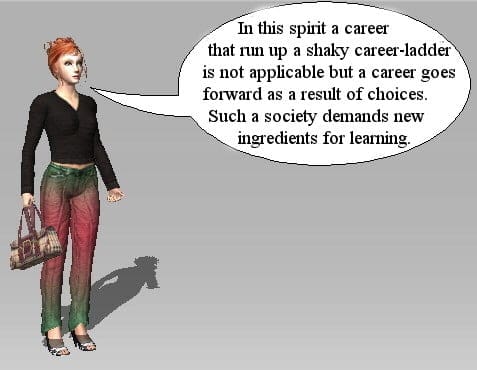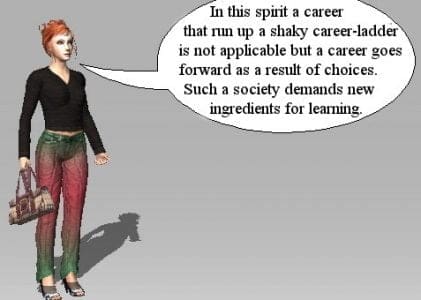 The digital revolution gives
The digital revolution gives![]() fuel to the creative revolution. This creates the foundation for the shift of paradigm, where it is not any longer the best adapted that will reach the longest but most creative. In this spirit a career that runs up a shaky career-ladder is not applicable but a career goes forward as a result of choices. Such a society demands new ingredients for learning when it comes to school-education and further to the lifelong learning. Below five critical skills are described that is crucial for success in the knowledge society. These can be connected to the entrepreneur’s everyday life as well as the working life in general.
fuel to the creative revolution. This creates the foundation for the shift of paradigm, where it is not any longer the best adapted that will reach the longest but most creative. In this spirit a career that runs up a shaky career-ladder is not applicable but a career goes forward as a result of choices. Such a society demands new ingredients for learning when it comes to school-education and further to the lifelong learning. Below five critical skills are described that is crucial for success in the knowledge society. These can be connected to the entrepreneur’s everyday life as well as the working life in general.
“What we need is an entrepreneurial society in which innovation and entrepreneurship are normal, steady and continual.” Peter F. Drucker
Five competences for the knowledge society
1.Entrepreneurship: Initiative and identify possibilities
Where other sees difficulties, the entrepreneur sees possibilities; this is a skill that needs continual training. Like the anecdote of the shoe company that sent out two salesmen to explore the market for its products in a country in Africa. The first came home and reported that ”this is nothing for us, nobody wears shoes”, while the other enthusiastically reported ”nobody wears shoes, what a gigantic market!”
2.Market: Do not compete, create a comparative advantage
Basically this is building a brand and this could mean both for a business as well as a personal brand. Social media is an important driving-force and tool in this development. Which values do you want to personally mediate? Which values do you want that your company to mediate? What should your design communicate? However, it is not enough with a polished surface and inner values; the communication must have a qualitative content too. Content and the aims for the communication determines to a large extent which tools and channels that should be used.
3.Marketing: To place yourself in the shoes of the client
Listen and communicate with clients and then present a functional solution that fulfils their requirements. Mass-communication á la the industrial society is by now a very ineffective method. Something that easily can be transferred to human relations in general since it basically is about to understand other humans intentions and conditions.
4.Ethics: Leadership and philanthropy
World-mapping watch and -analysis is critical for a successful leadership, in order to win comparative advantages on the competitive market and at the same time give support where help is required. Competition and cooperation is no longer each others opposites, on the contrary it is each others relatives.
5.IT: To use new technology to reach your goals
The digital revolution besides the general globalisation is the engine of the development from the industrial society’s mass-production lines to the knowledge society’s project and customer adaption.
The analysis-method of the entrepreneur Jan Stenbeck
Jan Stenbeck is the founder of Metro, Millicom, Tele2 and MTG. He was also the man who invented the prepaid card for cell phones as well as breaking the state TV-monopoly and telephoning monopoly in Sweden during the 1980s. Stenbeck used the following simple analysis model for renewal of business that works perfectly for the society in general too.
1. Somebody has an idea.
2. Money beats the idea.
3. Politics beats money.
Too many good ideas die in step 2-3 in the renewal process, the ones that find money for development, too often conservative decision-makers on chief-level within organisations and political policy wipe out the prospects for.
But surprise! Jan Stenbeck’s analysis model has a step 4.
4. Technology beats politics … which his own work is a stunning proof of. Per Andersson, that has written a very readable biography about Jan Stenbeck writes:
”Jan Stenbeck strives to be in step 4. Where new technology kicks away the footing for political policies, and new market opens for new business opportunities – that is where you should invest, said Stenbeck.”
Here you also find the core of the societal transformation after industrial society’s departure, the human creativity and ability to innovation is what drives the development forward, not money, nor politics.
Written by LarsGöran Boström©
Source:
Stenbeck. – Ett reportage om det virtuella bruket av Per Andersson Nordstedts år 2000
Opens in a new tab



